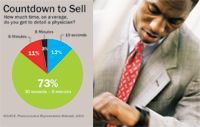Beyond Multiple Choice
Imagine you're a college student cramming on the night before a big biology exam. You've missed some classes and need a tutor. So you call up the tutoring center and request a student to come help you. A tutor is at your door in an hour, but he's a history major, not a biology major. He claims his area of expertise doesn't matter since he knows how to teach. But you're up against a tight deadline, and reluctant to take his word for it.
Imagine you're a college student cramming on the night before a big biology exam. You've missed some classes and need a tutor. So you call up the tutoring center and request a student to come help you. A tutor is at your door in an hour, but he's a history major, not a biology major. He claims his area of expertise doesn't matter since he knows how to teach. But you're up against a tight deadline, and reluctant to take his word for it.

Jane Chin
Now imagine you're a doctor listening to a sales rep talk about a drug he doesn't know much about. A 2005 Verispan poll of more than 5,000 physicians indicated that their top complaint was that reps don't have enough clinical knowledge. A misconception: If reps can recite clinical information, it must mean they understood what they're saying. Reps are given sales scripts that might contain correct information, including answers to common clinical questions, but many times doctors ask questions that reps cannot answer.
Couple this information with a 2004 Pharmaceutical Representative poll (see "Countdown to Sell") that showed reps get on average 90 seconds to communicate complex clinical information to a physician, which can create many problems. Without the appropriate level of clinical competence, reps can be seen as wasting doctors' time, or worse—disseminating information that gets the company he's representing in trouble.

Countdown to Sell
Physicians don't want reps to just memorize clinical information—they want them to comprehend it. If reps understand the information, they can apply that knowledge to answer the physician's questions. The doctors want to trust that reps and medical-science liaisons (MSL) are giving them the right information.
Such is a challenge for the industry: to prove that its representatives offer value beyond free samples. But clinical competence doesn't just happen. Companies must work to ensure that their clinical training of sales representatives meets the needs of the physicians being called on. Here are five best practices in clinical training for today's pharmaceutical reps.
1. How Much Do Reps Know?
Sales reps have a limited time to learn a large amount of clinical information. They need to know about the drug, the disease category, and the competitors in the space. But when sales trainers administer baseline assessments for reps, they often fail to decipher how much reps know from what they know. That's because pharma companies tend to administer assessments that are broad in scope and scientifically superficial. Some examples of assessment questions include: What comorbid risk factors often accompany diabetes? Or, what is the mechanism of action of a platinum-based cancer drug? Instead, companies should ask more in-depth questions—How does diabetes increase cardiovascular risk? Or, how does the mechanism of action of platinum-based cancer drugs make these good agents to combine with radiation therapy?—to ensure that reps gather a full scientific understanding of each concept. Answers to these questions are the difference between reps who are able to give doctors detailed explanations of "how" something works and those who only can offer one-word answers to the "what" questions.
2. Create Context
Adult learning principles suggest that adults learn and retain information better when they know how it applies to their jobs. Traditionally, sales training is highly interactive and is often taught through role-playing techniques that mimic real-life scenarios. On the other hand, clinical training frequently is passive and limited to hours of "data dumping," where reps are not taught specific situations in which clinical information can be applied. This can result in reps feeling as though clinical information is far-removed from their day-to-day selling activities.
Scenario-based clinical training is helpful because it educates reps about specific contexts in which clinical information may be used, and allows representatives to practice applying clinical communication skills in a learning environment.
3. Address Multiple Preferences
Clinical information can be complex, and many clinical training programs rely on visuals as training materials for representatives. Visual collaterals and scenario-based training can address the needs of representatives with visual and kinesthetic learning preferences. Representatives with auditory learning preferences may welcome audiotapes or CDs that verbalize clinical information as useful learning tools. Companies have been embracing Web-based learning technologies to enable continuing education for reps as well—podcasting has become a popular entertainment medium. No one approach works best to cover all learning preferences; for those who prefer training by the more traditional routes, on-site training gives trainers the flexibility to cover all learning preferences in person.
4. Teach Through Questions
Frank Melfa, district manager for Wyeth, helps reps learn clinical information by asking them questions. In his book, Pharmaceutical Landing, Melfa stresses how important it is for managers to be knowledgeable about the products, so that reps know exactly how to present, ask and answer the right questions, overcome objections, and close the sale.
In my own experience, I once had an opportunity to teach undergraduate students in biochemical oncology. When I started asking them questions about the "how" and the "why" of a clinical study, the students did not understand my questions and did not know the answers. For example, rather than just asking what chemical reaction was used to measure an enzyme level, I asked the students why a certain chemical reagent was used to measure the enzyme's activity, and how chemical-to-enzyme reactions gave us information about how our body uses energy. I knew it was important for them to understand the rationale for how the study was conducted instead of just memorizing the facts in the clinical study.
I found out that if my students just memorized information, they were not able to synthesize it in a way that enabled them to turn clinical information into knowledge—and apply it to a new situation. This is often the same case with sales reps: Many doctors complain that representatives recite scripted messages and are often unable to answer questions outside of a sales script. Engaging representatives with questions that require answers beyond the expected "multiple choices" can provide managers and trainers with insight to representatives' comprehension of the information, and not just whether the representatives have memorized what to say.
5. Reinforcement Leads to Retention
Clinical training is most effective if trainers continue to educate reps throughout their tenure at the company—intensive training during the first few weeks is not sufficient. By the end of most information-intensive programs, most sales reps will have forgotten a lot of the information they were given in a controlled training environment. It's crucial that pharmaceutical companies invest in fostering long-term training for their sales forces.
When representatives go out into the field after training, they often default to selling approaches that they are comfortable with. Without consistent encouragement—including one-on-one coaching with district managers and district-level training meetings—representatives may not apply the clinical communication approaches that they learned during training. It takes most adults at least six months of consistent reinforcement before being able to fully internalize concepts in a way that actually can be used when speaking to a physician. By consistently reinforcing clinical training, pharmaceutical companies can help their sales reps to become more comfortable discussing clinical information with physicians. Some ways to do this include holding weekly teleconferences or clinical training sessions during district or regional POA meetings.
Experts have been talking for years about the pharmaceutical industry facing an inflection point. An important inflection point exists for sales representatives during each interaction they have with a healthcare practitioner: Everytime a rep opens his mouth to speak with a doctor, he makes an impression that contributes to the value that doctor places on the rep's product. Representatives may not have any control over physicians' conclusions or decision-making process, but they do have control over the quality of information that's delivered.
Jane Chin is managing partner of pharmrepclinic.com. She can be reached at jane@pharmrepclinic.com
Addressing Disparities in Psoriasis Trials: Takeda's Strategies for Inclusivity in Clinical Research
April 14th 2025LaShell Robinson, Head of Global Feasibility and Trial Equity at Takeda, speaks about the company's strategies to engage patients in underrepresented populations in its phase III psoriasis trials.
Beyond the Prescription: Pharma's Role in Digital Health Conversations
April 1st 2025Join us for an insightful conversation with Jennifer Harakal, Head of Regulatory Affairs at Canopy Life Sciences, as we unpack the evolving intersection of social media and healthcare decisions. Discover how pharmaceutical companies can navigate regulatory challenges while meaningfully engaging with consumers in digital spaces. Jennifer shares expert strategies for responsible marketing, working with influencers, and creating educational content that bridges the gap between patients and healthcare providers. A must-listen for pharma marketers looking to build trust and compliance in today's social media landscape.
Asembia 2025: Therapy Advancements Highlight Growing Cost and Access Concerns
April 30th 2025Fran Gregory, VP, emerging therapies, Cardinal Health, discusses the evolving cell and gene therapy landscape, highlighting pipeline growth, cost challenges, and emerging therapeutic areas beyond oncology and hematology.
